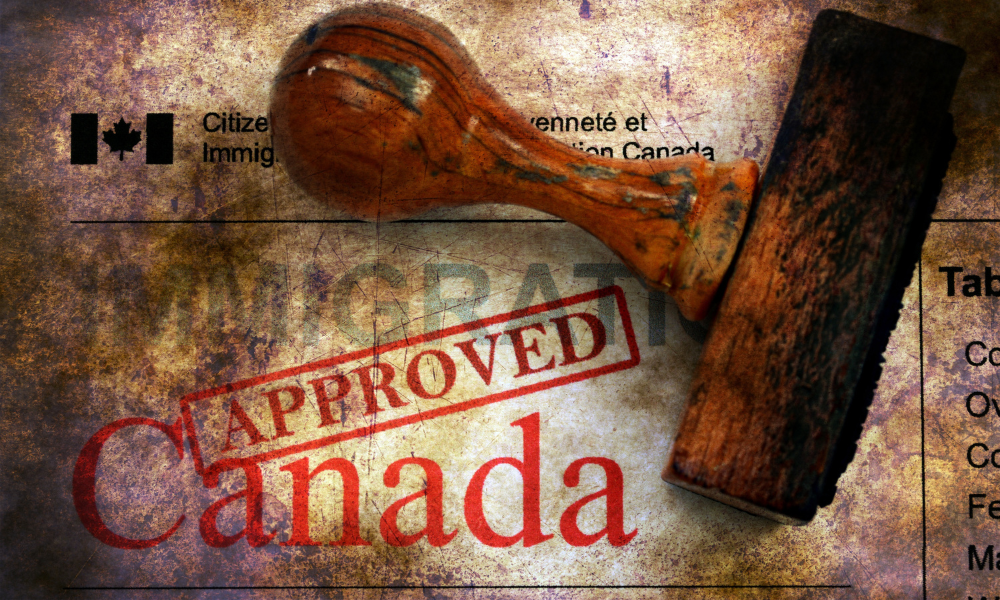- Types of residency for Indians in Canada
- How to move to Canada from India
- Is it easy to migrate to Canada from India?
- Admissibility to migrate to Canada from India
- What is the fastest way to migrate to Canada from India?
- How long can an Indian citizen stay in Canada?
- Plan to migrate to Canada from India?
Efforts to migrate to Canada from India is very common. In fact, around 26 percent of immigrants come from India, closely followed by the Philippines and China. As of 2024, Indians make up most of the immigrants applying for residency in Canada.
But how do they immigrate to Canada? It depends on the qualities or characteristics of the citizen of India. If the requirements set by Canada are met, immigration from Canada to India is possible.
Types of residency for Indians in Canada
Those who want to migrate to Canada from India have two pathway categories to choose from. They can migrate as temporary residents or as permanent residents. One lets you stay permanently while the other has a specific time limit.
Temporary residents can become permanent residents. In turn, permanent residents can apply for citizenship.
A person migrating to Canada through Family Reunification or Express Entry gets permanent residency status. Student permit and temporary workers are only given temporary residency status.
How to move to Canada from India
Applicants who plan to migrate to Canada to India have several pathways for entry – here's an overview:
Spousal sponsorship
Being sponsored by a spouse is one of the more common ways to migrate to Canada from India. This happens when an eligible Canadian citizen or permanent resident marries or is in a committed relationship with a foreigner. Through sponsorship, the foreign partner can become a permanent resident after successfully going through the process.
Committed relationship is the key phrase here. The Canadian government is very serious in determining whether the relationship is valid or not.
Entering into a fake relationship for the sake of immigration can expose the sponsor to penalties. At the same time, the person being sponsored can be banned from entering the country.
Family sponsorship
Family sponsorship refers to sponsoring certain relatives, specifically parents, grandparents, and dependent children.
While a spouse falls under the word “family”, there are differences in the immigration process. For example, the sponsorship of family members often has a minimum income requirement. This is an amount that must be met by the sponsor.
In both cases of sponsorship, the sponsor must sign an undertaking. This undertaking is a promise to support the people being sponsored. This is a continuing commitment for years, depending on the person being sponsored.
Here’s a chart that shows exactly how long each sponsorship lasts:
|
Relative |
Undertaking starting on approval |
Undertaking for sponsors in Québec |
|---|---|---|
|
Spouse or partner |
3 years |
3 years |
|
Dependent child |
10 years or until the age of 25, whichever comes first |
|
|
Dependent child under 16 years old |
|
At least 10 years or until the age of 18, whichever is longer |
|
Dependent child 16 years old or older |
|
At least 3 years or until age of 25, whichever is longer |
|
Dependent child 22 years old or older |
3 years |
|
|
Parent or grandparent |
20 years |
10 years |
|
Other relatives |
10 years |
10 years |
Québec has different rules when it comes to the period of undertaking. The province also has different requirements for minimum necessary income or MNI. Sponsors residing there must ask immigration lawyers in Québec to guide them through the process.
International students and graduates
An Indian national can migrate to Canada as an international student. This involves applying for a student permit starting with enrollment in a Canadian Designated Learning Institution (DLI). These educational institutions were approved by the government to offer education to international students.
The DLI will issue an acceptance letter which will be used to process the student's permit. However, the issuance of a permit will depend on the following:
- Proof that the student can pay for their tuition
- Proof of capacity to pay for living expenses of the student and any companion
- Proof of return transportation of the student and any companion
To migrate to Canada from India, the student must also prove lack of criminal record and good health.
The student permit will contain other conditions such as whether the student is allowed to work or the date of departure from Canada.
After graduating, the student can apply for a Post-Graduation Work Permit (PGWP). This Permit will allow graduates to work in Canada. The PGWP is only available through select programs granted by the DLI.
Express entry Canada
Another way to migrate to Canada from India is through Express Entry. This points-based process is managed by the federal government and lets the applicant become a permanent resident. It applies to skilled workers who want to migrate through any of the following:
-
Canadian Experience Class (CEC): for foreign skilled workers who have previously worked in Canada and gained work experience for a period of three years
-
Federal Skilled Worker Program (FSWP): for foreign skilled workers with work experience outside Canada for a period of one year over the last ten years. This work experience must be related to the Canadian job being applied for
-
Federal Skilled Trades Program (FSTP): for foreign skilled workers qualified in a skilled trade of a certain industry or sector (e.g., culinary, transportation, natural resources, agriculture, processing, and manufacturing)
Skilled workers applying under this program are chosen based on work experience, education, language skills, and even past managers and supervisors.
Provincial nominee programs
Another option to migrate to Canada from India is the Provincial Nominee Program (PNP). Each province or territory sets its own requirements for the entry of immigrants within their jurisdiction. The nominees are usually categorized as:
- Skilled workers
- Semi-skilled workers
- Students or graduates
- International entrepreneurs
The PNP requirements are subject to change. This is because they depend on the needs of the nominating province or territory.
Note that PNP and Express Entry often work together. A province/territory nominates the Indian national who can then apply for Express Entry.
However, do not be confused with Non-express Entry, which is another pathway under PNP. So, what is the difference between these pathways? Here’s how you look at it:
|
Express Entry via Federal |
Express entry via PNP |
Non-express entry |
|---|---|---|
|
Application through the federal website |
Application is through the federal website with provincial nomination |
Application through the provincial website |
|
Requirements set by the federal government |
Indian applicant must meet the requirements of the province and the federal government |
Requirements set by the province or territory |
|
Successful applicant can reside in any province or territory of Canada |
Obtain a nomination from preferred provinces |
Those who migrate to Canada from India via PNP must reside and work in the province/territory that nominated them |
|
|
Update the express entry profile upon receipt of nomination |
|
Start-up visa program
Another way to migrate to Canada from India is through the federal government’s Start-Up Visa Program. Through this pathway, entrepreneurs or employers can establish residence in Canada to create jobs for existing residents.
Under this visa program, the Indian applicant must qualify and get the support of a designated organization. They must also meet the language requirements and bring sufficient funds to live in the area.
Here’s some useful information on the Start-up visa:
Self-employed program
It’s also possible to migrate to Canada from India as a self-employed individual. This pathway is open to people who have experience in Canada’s cultural activities and athletics. The applicant should also be willing to contribute to Canada’s cultural or athletic life.
The associated fees for migrating to Canada from India depend on the pathway chosen.
For more detailed guidance on any of these pathways, contact a Lexpert-ranked immigration lawyer in your province/territory.
Is it easy to migrate to Canada from India?
Moving to Canada from India is a long and challenging process. Fortunately, immigration programs are available online, allowing applicants to research the process before application. Any difficulty usually comes from the preparation process where the applicant collects all the necessary documents from their home country.
Filling in forms can also be a confusing process. This is especially true for immigrants applying through federal and provincial pathways.
What are the new rules for temporary residents?
In 2025, new regulations affecting temporary residents in Canada took effect. This heavily impacts those who want to migrate to Canada from India. Under these new regulations, only the spouses of certain temporary residents can apply for Open Work Permits (OWP).
Here’s a chart showing which temporary residents are eligible for OWPs for their spouses:
|
International Students must be enrolled in any of the following: |
Employment category of Temporary Foreign Workers |
|---|---|
|
Master’s program that last 16 months or more |
TEER 0 or 1 occupations (high-skilled roles) |
|
Doctoral programs |
Certain TEER 2 or 3 occupations (sectors with labor shortages, may change from time to time) |
|
Certain professional programs like nursing, medicine, law, and engineering |
|
Admissibility to migrate to Canada from India
In all cases, the applicant planning to migrate to Canada from India must be admissible. This means that they must possess all of the qualifications and none of the disqualifications for entry. This strict requirement is in place to protect the safety and security of the country and its citizens.
An Indian applicant may be inadmissible in Canada for the following reasons:
- security risks
- criminality
- health reasons
- financial reasons
- misrepresentation
- human or international rights violations
- non-compliance with the Immigration and Refugee Protection Act (IRPA)
The reasons for inadmissibility are not limited to those mentioned above.
What is the fastest way to migrate to Canada from India?
The fastest way to migrate to Canada from India is through the express entry system. The processing time takes approximately 6 months. However, the sheer number of applications could slow down the approval process. Having a lawyer who will help with the forms and preparation should help minimize delays due to mistakes in filing.
For spousal sponsorships, the period usually takes a year or more. The waiting period starts from the submission of the application. Preparing the documents can also take a long time depending on the issuing agencies.
Here’s a better look at the expected timeline to migrate to Canada from India:
Curious about the immigration process for Filipinos? Here’s an article on how to move to Canada from the Philippines.
How long can an Indian citizen stay in Canada?
Indian citizens under a visitor’s visa can stay in Canada for up to 6 months. Those who get temporary resident status can stay for as long as the reason for their residency exists. For example, an Indian citizen on a student visa can stay in the country for as long as they are studying in the DLI.
Plan to migrate to Canada from India?
Anyone planning to migrate to Canada from India has multiple pathways for entry. In all cases, however, the application process should be followed strictly. Misrepresentation or any effort to conduct fraud can result in a permanent ban. Done correctly, Indians can apply for permanent residence and hope for approval.
Want to find out more about how to migrate to Canada from India? Check our Legal FAQs page to learn more about the immigration process.
Related Articles:
Critical changes on how to move to Canada from US





